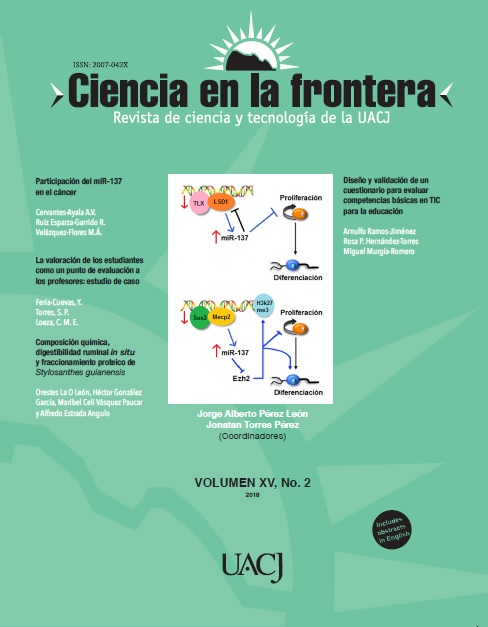La valoración de los estudiantes como un punto de evaluación a los profesores: estudio de caso
Keywords:
Evaluación docente, estudio longitudinal, relación Profesor-EstudianteAbstract
This paper reports a longitudinal study to know how the students qualified their first and second semester’s teachers of a newly created career. They qualified six attributes: a) Frame of course; b) Language used in the classroom; c) Compliance with the work program; d) Resolution of doubts in class; e) Support and advice in field; and f) Tutorials. Analyzing the data, there was a difference between form and substantial attributes, these one having the lowest scores. Likewise, it was observed that teachers receive lower grades as time passes, between “Good” and “Regular”, being a focus of attention and a window of opportunity for the improvement of teaching practice. It is concluded that what students value most and what they qualify with more detail, is the Teacher-Student interaction,References
Ávila, L. J. y Tavares, S. M. J. (2018). “Resistance to
classroom observation in the context of teacher
evaluation: teachers’ and department heads’ experiencies
and perspectives”. Educ. Assc. Eval.
Acc 30:7-26 DOI 10.1007/s11092-017-9261-5
Davis, H. A. (2003). “Conceptualizing the role of
student-teacher relationships on children’s social
and cognitive development”. Educational
Psychologist. 38, 207-234.
Davis, H. A. y Lease, A. M. (2007). “Perceived organizational
structure for teacher liking: the role of
peers’ perceptions of teacher liking in teacherstudents
relationship quality, motivation and
achievement”. Social Psychology of Education.
:403–427 DOI 10.1007/s11218-007-9031-1.
Feldens, M.G.F. y Duncan, J.K.(1986). “Improving
university teaching: what Brazilian students say
about their teachers”. Higher Education 15:641-
Feldman K.A.(1976). “The superior college teacher
from the students’ view”. Research in higher education.
:243-288.
Feldman, K.A. Identifying exemplary teachers and
teaching: evidence from students ratings. En
Perry R.P. y Smart J.C. (Eds.) The scholarship
of teaching and learning in higher education:
An evidence-based perspective. Netherlands,
Springer. 93-143, 2007.
Goe, L., Bell, C. y Little, O. Approaches to evaluating
teachers effectiveness: A research synthesis.
Whashington D.C., E.U.A. National Comprehensive
Center for Teacher Quality. Pp. 1-100.
Hamre, B.K. y Pianta, R.C. (2001). “Early Teacher-
Child relationships and the trajectory of
children’s school outcomes through eighth grade”.
Child Development 72(2):625-638.
Henderson-King, D. y Smith, M. N. (2006). “Meaning
of education for university students: academic
motivation and personal values as predictors”.
Social Psychology of Education 9 195-221
DOI: 10.1007/s11218-006-0006-4.
Marks, H. M. (2000). “Student engagement in instructional
activity: Patterns in the elementary,
middle and high school years”. American educational
research journal 37(1): 153-184.
Millet, C.M., Stickler, L.M., Payne, D.G. y Dwyer,
C.A. A culture of evidence: Critical features of
assessments for postsecondary student learning.
Educational training service, E.U.A. Pp
-23. 2007.
Pianta, R. C., Hamre, B. K. y Allen, J. P. Teacher-
Student relationships and engagement: Conceptualizing,
measuring, and improving the capacity
of classrooms interactions. En Christenson
S.L., Reschly A.L., y Wylie C. (eds). Handbook
of research on student engagement. New York,
EUA. Springer Verlag New York. 365-385, 2012.
DOI 10.1007/978-1-4614-2018-7_17.
Raviv, A., Bar-Tal, D., Raviv, A., Biran, B. y Sela, Z. (2003). “Teachers’ epistemic authority: perceptions of students and teachers”. Social Psychology of Education 6:17-42.
Spilt, J. L., Koomen, H. M. y Thijs, J. T. (2011). “Teacher wellbeing: The importance of Teacher-Students relationships”. Educational Psychology Review, 23:457-477 DOI 10.1007/s10648-011-9170-y
Wei, Michael, Zhou, Yalun, Barber, Carolyn y Den Brok, Perry. (2015). “Chinese students’ perceptions of teacher-student interpersonal behaviour and implications”. System 55. 134-144


